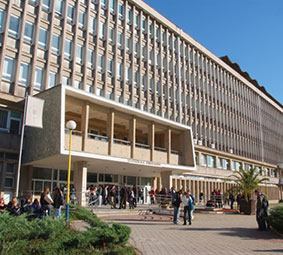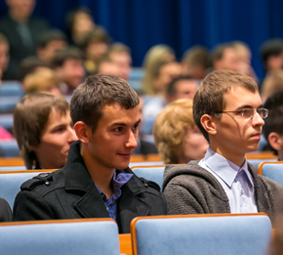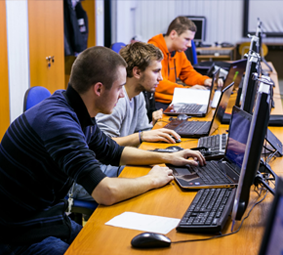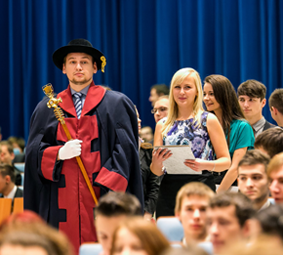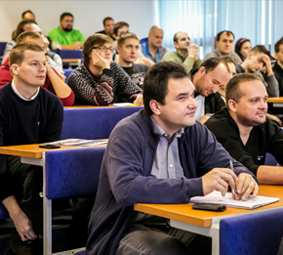About the Study Process
Basic Information
The study in the Computer science study program is organized into three successive degrees:
- 1. stupeň - bachelor study program (3 years),
- 2. stupeň - master study program (2 years) and
- 3. stupeň - doctoral study program (4 tears).
By absolving high school graduation you'll fullfill the conditions for applying to the bachelor study program. In the subsequent degrees you can continue only after successfully finishing the previous ones.
Conditions for Admission, Application and Acceptance
After application and successfull acceptance, the applicant will receive a registred letter with the information and date of erollment.
- The enrollment is mandatory and necessary for successful start of the study on KPI
- The date of the enrollment will be stated in the letter. It is necessary to provide a proof of enrollment and tuition fees payment.
- The enrollment is done before each year start.
After the enrollment, you will receive a unique login and an ISIC card, which, in addition to identifying your person, also serves for traveling and canteens. You will also be included in the MAIS information system for keeping the overall record of your study.
How Does it Work on a University?
Each year is divided into two semesters, winter and summer. The study goes under the standard credit system, which means you have to gain minimal credit to proceed to the next year. Credits are obtained for each subject and minimum credit to proceed to the next year is determined by the university regulations.
Information about the Semester Process:
- Classes in each semester last for 13 weeks.
- Final years mostly have shortened semesters, so it can also be less, e.g. 11.
- The last week of each semester is for obtaining credit.
- This means, that you have to gain points to gain the credit, often by fulfilling assignments or in a form of a test.
- The credit is the amount of points, which you need to gain to be able to attend the subject's final exam.
- Minimum number of points is absolute majority.
- The number of points needed for minimal credit are usually defined by your lector in the first exercise or lecture, or in the subject's information page.
- After successfully gaining the credit comes the exam period, which usually lasts 4 to 6 weeks.
- During the exam period, exam dates are published for each subject.
- The exam dates can be found in the MAIS information system.
- In the system, you have to sign up for the exam and it is not possible to sign out 24 hours before the exam.
- If you successfully manage the exam, the results will be recorded in the MAIS system and you gain the number of credits defined for the particular subject.
- To successfully pass an exam, you have to gain at least 51% of credit in general (mark E).
- If you do not pass the exam (mark FX), you have two more attemts to retake the exam (first and second resit).
- If you are signed up for an exam date, but you won't come to the exam, it is counted as an unsuccessful attempt (FX).
- If you don't fulfill any conditions, the world doesn't end, but you have to retake the subject in the next semester. This can happen if:
- You won't gain the minimum credit.
- You won't pass the exam in the second resit.
- You were absent on the exercises during the semester 3 or more times.
- Benefits of being an brilliant student? The faster you pass all final exams, the sooner begin your holidays! :) Duration of the holidays:
- Summer holidays: last until mid-September.
- Winter holidays: last until the end of March.
At the end of each study program (bachelor, master and doctoral) takes place the state exam. Here you defend your research thesis that you've worked on during:
- the last two semesters of bachelor study,
- the last three semesters in the master study,
- or during the whole doctoral study.
Based on the state exam results you'll obtain a diploma. The state exam in the master study program also includes an exam from selected master study subjects.
Study and social agenda for the study is provided by the faculty study department. One officer of the study department is assigned for each year of all the study degree programs.
Individual Study, Social Cases
In case you are not able to study under the standard study program for any reason, you may apply in writing for the individual study plan under the rules of the university regulations.
Social cases unable to finance their studies from own resources may apply for a social scholarship or a student loan. The students with the best academic results can also get an annual merit scholarship. More information on scholarships and loans will be provided the study department.
About how we Teach
During the study we:
- use modern teaching methods and tools including mobile devices,
- put emphasis on student independence and the ability of creative and individual work,
- support team work on projects of development and research character,
- apply individual approach of leading students on multiple subjects of both bachelor and masters degree.
We also try to ensure the cooperation with practice, in which we are the best in Slovakia (source: KPI live projects, European project Undergraduates to practice). We have experienced lectors, who will prepare you both for the labour market and further research activities. Read more about why study with us.
Information Centers, Libraries
Part of the faculty are also study and information centers (libraries, PC centre, ICT), whose professional and scientific book collection, informative, bibliographic and documentary activities create conditions for successful studies and scientific research work for the students. In addition to the university libraries, students can study in other libraries of Košice and other cities. PC Centre of the Faculty and Institute of Computer Technology (ICT) provides students with the technological support for their studies.
If you want to Travel
We intensively support student mobilities in all three study degrees. The students have the possibility to engage in the world university studies with the following grant programs:
- Erasmus+
- CEEPUS - Central European Exchange Program for University Studies
- Kopernicus
- Study programs mediated by the SAIA agency
During the doctoral study, the students have the extra possibility to attend to domestic or foreign conferences or exchange visits in Europe and beyond.
Accomodation, Food, Sport, Culture
Accomodation and food are provided by the student dormitories and canteens. The university students and staff can use sport centers - stadium, playgrounds, gyms, tennis courts, squash center, leisure centers, bowling club, sporting events and so on. V-club is at the students' disposal for cultural events.

